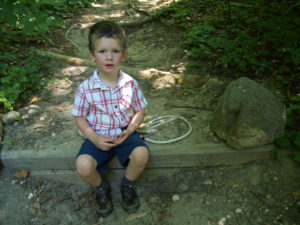PRESCHOOLERS’ POINTS OF VIEW & DECEPTIONS
There is a big shift in three- to four-years-olds in their ability to understand beliefs that are different from their own. As we have seen in previous posts, during their third year, children develop a strong sense of themselves. The word “I” is central in their vocabulary. But they still believe that everyone thinks what they do. However, by their fourth year, children want a different kind of recognition. They want their ability to think from others’ points of view to be respected. If it’s not, they may feel hurt, slighted and babied.
WHAT IS “THEORY OF MIND”?
WHY IS IT IMPORTANT FOR PRESCHOOLERS?
Theory of mind (“ToM”) is the ability of the child to understand that people have beliefs, intentions, wishes, and feelings referred to as mental states. By age four, children understand that others have mental states different from their own. This is a milestone in their development.
Some children with special needs such as those on the autistic spectrum and others with emotional disorders often have deficits in this ability when they are young, but many can attain this milestone as they grow older with special education and emotional counseling. It is important for parents and special education teachers to help children reach this goal, so they can relate well to others and feel liked.
THINGS AREN’T ALWAYS THE WAY THEY SEEM
Watch this video about the FALSE BELIEF TEST that illustrates the differences in the Theory of Mind in action between three and four-year-olds.
After viewing this video, it should be clear how far apart three- and four-year-olds are in their understandings of how things may not be as they appear. The older children understand deception. They are not easily fooled.
 WHY DO PRESCHOOLERS
WHY DO PRESCHOOLERS
STUDY THE FACIAL
EXPRESSIONS OF OTHERS?
Social Referencing is when children study the facial expressions of others to see how they should think, feel and behave. This begins as early as 7 months. By 18 months, the child studies others’ expressions but then also has their own ideas of how to think, feel, and behave. By preschool, three- and four-year-olds have developed their own expectations of themselves and the ability to follow rules. They compare their own judgment about how to behave with the expression on the teacher’s or parent’s facial expression to see if they are acting correctly or not.
WHEN PRESCHOOLERS ENGAGE IN DECEPTION
Preschoolers impulsively do what they want to do instead of following the rules, such as take another child’s toy away from them without asking; they may attempt to deceive the teacher or parent by blaming the other child for the misdeed. They are conscious of right and wrong and don’t want to be viewed as “bad.” Even if they are justly accused of misbehavior, they may not feel heard because they want to be seen as “good.”
They may even insist, “He did it. You aren’t listening to me. You don’t get it.”
LEARNING MORAL REASONING
AND FEELING HEARD
How do you help the child know the difference between right and wrong and still feel heard? How do you let your child know he misbehaved but you still understand he wants to be viewed as a good child?
One option is for the teacher or parent to recognize the child’s conflict: “You wished to do the right thing but you wanted the toy more, so you took it away from Todd.”
Then tell the child how to correct the misbehavior: “You can say, ‘I’m sorry’ to Todd and ask him if you can have a turn.”
In this way the teacher or parent solves the moral conflict—being good, not bad—and listens to the child’s need at the same time. Some three- and most four-year-olds can accept that kind of response and grow from it.
A second option is to again recognize the child’s conflict: “You wished to do the right thing, but you didn’t make a good choice, so you took the toy away from Todd.”
Then add how to correct the misbehavior: “Now make a good choice and say you’re sorry and ask if you can have a turn.”
In grade school moral reasoning develops more fully.
 Learn more about solving problems with preschoolers using Parental Intelligence.
Learn more about solving problems with preschoolers using Parental Intelligence.
